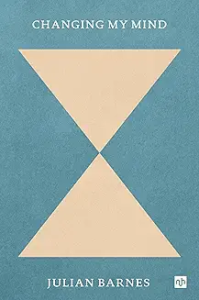Changing My Mind by Julian Barnes 2025
Barnes is one of England’s finest contemporary writers having won the Booker Prize in 2011 for “The Sense of an Ending” and has also won acclaim for his essays and criticism. I have found both his fiction and non-fiction to be outstanding and was excited to find this small volume on a shelf at the Cambridge Public Library.
Beyond the wisdom and fine writing in Barnes’ essays, the book introduced me to a wonderful series of publications from the Notting Hill Editions, a small boutique publishing firm in London founded by the late Tom Kremer who popularized Rubik’s cube. At the age of 80, Kremer set out to revive the art of the essay by “creating exceptionally beautiful books that would be cherished….In an era of information overload, these collectible pocket-sized books distil ideas that linger in the mind.” Having dabbled in their web site and having read Barnes’ contribution, I must agree. Splendid work!
The Barnes book comprises five essays entitled Memories, Words, Politics, Books, and Age and Time. In the best tradition of the essay, they display the author’s working out his opinions in real time on the page, not promoting a viewpoint, but sorting out his own thoughts. As E.M. Forster who is featured in the essay on Books once said, “I don’t know what I think until I’ve read what I’ve written.” That quote has been attributed to Forster, Woolf, and others, but I like it no matter who first said it.
We see Barnes working out (‘to try’ is the French translation of essay) his viewpoints on changing his mind in the first essay, slyly posing the question of who’s changing what mind since the very nature of ideas, memory, mind, and brain are so little understood. In Words, he explores his lifelong love affair with words, decrying the misuse of ‘disinterested’ and ‘uninterested’ and other modern fashions. In Politics, he attributes his shifting support of various parties to the move to the right of political parties not to his own move to the left, and offers up a superb description of BBR, Barne’s Benign Republic characterized by a list of progressive, liberal policies. In Books, we get a reassessment of Forster and a wonderful few pages about Georges Simenon, his 75 Maigrets, and his 200 or so romans durs, translated as hard novels or tough novels. Simenon evidently was incensed that he didn’t get the Nobel Prize, and amazingly, Barnes ends up agreeing with him along with other fine writers, including Faulkner, Gide, Colette, Spark, Mauriac, Eliot, Maugham, and John Le Carre. Who knew??? The final essay is particularly interesting as Barnes who is only one year younger than I works his way through time, aging, and death.
This is a fine book written by an intelligent and accomplished writer. I’m eager to subscribe to Notting Hill Editions and receive a book a month full of essays and wisdom. You should try starting with Barnes.



